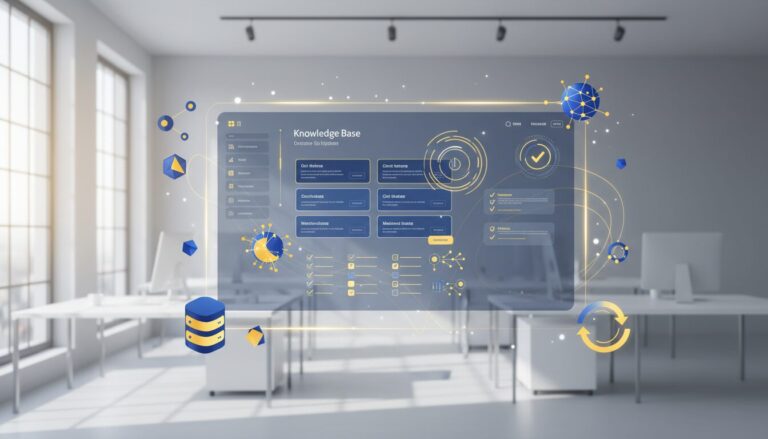Table Of Contents
- Understanding AI in Healthcare: The Basics
- Types of Healthcare AI Applications
- Key Benefits of AI Apps in Healthcare
- Challenges and Considerations When Implementing Healthcare AI
- How No-Code AI Platforms Are Democratizing Healthcare Innovation
- Building Your First Healthcare AI App: A Step-by-Step Approach
- Real-World Examples of Successful Healthcare AI Applications
- The Future of AI in Healthcare
The healthcare industry is experiencing a technological revolution, with artificial intelligence (AI) at its forefront. From improving patient outcomes to streamlining administrative tasks, AI applications are transforming how healthcare providers deliver care, how researchers develop treatments, and how patients manage their health. But for many healthcare professionals without a technical background, the world of AI can seem intimidating and inaccessible.
That’s where this beginner’s guide comes in. Whether you’re a physician looking to improve diagnostic accuracy, a hospital administrator aiming to optimize operations, or a healthcare entrepreneur with an innovative idea, understanding AI applications in healthcare is becoming increasingly essential. The good news? You no longer need a computer science degree or coding expertise to leverage the power of AI in your healthcare practice or organization.
In this comprehensive guide, we’ll demystify healthcare AI applications, explore their various types and benefits, address implementation challenges, and reveal how new no-code platforms are making it possible for healthcare professionals of all technical backgrounds to create custom AI solutions. By the end of this article, you’ll have a clear understanding of what AI apps for healthcare are and how you can start building your own—even without writing a single line of code.
AI Applications in Healthcare
Transform Healthcare Without Coding Skills
Major Types of Healthcare AI Applications
Diagnostic & Clinical Decision Support
AI that analyzes medical images and patient data to assist in diagnosis and treatment decisions.
Patient Engagement
Chatbots, virtual assistants and educational tools that enhance patient communication and support.
Administrative Efficiency
AI that automates scheduling, billing, documentation and other operational tasks to reduce burden.
Key Benefits of Healthcare AI
Improved Diagnostic Accuracy
Detects patterns that humans might miss
Enhanced Efficiency
Reduces costs and administrative burden
Personalized Care
Tailors treatment plans to individual patients
Expanded Access
Makes healthcare more accessible to underserved areas
Build Your Own Healthcare AI App (Without Coding)
Identify a Specific Problem
Define a clear healthcare challenge that AI could help solve.
Define App Functionality
Outline the inputs, processes and outputs your AI solution requires.
Choose a No-Code Platform
Select a platform like Estha that’s designed for non-technical users.
Gather Your Knowledge
Prepare relevant healthcare content and data to feed your AI application.
Build, Test & Refine
Create your application using drag-drop-link interfaces and iterate based on feedback.
Implement & Monitor
Deploy your AI app and continuously evaluate its performance.
Ready to Build Your Healthcare AI App?
Create custom AI applications in minutes with no coding required using Estha’s drag-drop-link interface.
Powered by Estha – Create custom AI applications without coding
Understanding AI in Healthcare: The Basics
Before diving into specific healthcare applications, it’s important to understand what we mean by “AI in healthcare.” At its core, artificial intelligence refers to computer systems that can perform tasks that typically require human intelligence—such as visual perception, speech recognition, decision-making, and language translation.
In healthcare, AI leverages algorithms and data to mimic human cognition in the analysis, presentation, and comprehension of complex medical and healthcare information. The foundation of healthcare AI is built on machine learning (ML) and deep learning techniques that enable systems to learn from large datasets, identify patterns, and make predictions or recommendations.
An AI application (or “app”) for healthcare refers to any software solution that utilizes AI technologies to address specific healthcare needs or challenges. These applications can range from simple chatbots that answer patient questions to sophisticated diagnostic tools that analyze medical images or predict disease progression.
The key distinction between traditional healthcare software and AI applications is the latter’s ability to learn and improve over time based on the data they process. This adaptive capability makes AI particularly valuable in healthcare, where information is constantly evolving and where personalization can significantly impact treatment outcomes.
Types of Healthcare AI Applications
Healthcare AI applications span a diverse range of functions and specialties. Here are some of the most common types you’ll encounter:
Diagnostic and Clinical Decision Support
These applications analyze medical data to assist healthcare providers in making accurate diagnoses and treatment decisions. They can process medical images (like X-rays, CT scans, and MRIs), interpret laboratory results, or identify patterns in patient symptoms that might indicate specific conditions. For example, AI algorithms have demonstrated remarkable accuracy in detecting diabetic retinopathy from eye scans or identifying potential cancerous lesions in mammograms—sometimes outperforming human specialists.
Patient Engagement and Virtual Assistance
These AI applications facilitate communication between healthcare providers and patients. They include virtual health assistants, chatbots, and educational tools that can answer medical questions, provide medication reminders, offer health tips, or triage symptoms. These tools not only improve patient satisfaction but can also reduce the burden on clinical staff by handling routine inquiries and administrative tasks.
Administrative and Operational Efficiency
AI applications in this category streamline healthcare operations by automating administrative tasks, optimizing scheduling, predicting patient flow, managing inventory, and handling insurance claims processing. By reducing administrative burden, these applications allow healthcare professionals to focus more on direct patient care rather than paperwork.
Predictive Analytics and Population Health
These sophisticated AI applications analyze large datasets to identify trends, predict disease outbreaks, forecast patient admissions, or identify high-risk patients who might benefit from preventive interventions. Population health AI can help healthcare organizations allocate resources more effectively and implement targeted interventions that improve community health outcomes.
Drug Discovery and Development
AI is revolutionizing pharmaceutical research by accelerating the discovery and development of new medications. These applications can analyze biological data, predict how molecules will behave in the human body, identify promising drug candidates, and even design novel compounds that might treat specific conditions.
Key Benefits of AI Apps in Healthcare
The adoption of AI applications in healthcare offers numerous advantages for providers, patients, and healthcare systems as a whole:
Improved Diagnostic Accuracy
AI applications can analyze vast amounts of medical data to help identify conditions that might be missed by human practitioners alone. They can detect subtle patterns in medical images or laboratory values that indicate disease, potentially enabling earlier diagnosis and treatment. For example, AI algorithms have been shown to detect certain cancers at earlier stages than traditional methods, when treatments are typically more effective.
Enhanced Efficiency and Cost Reduction
By automating routine tasks and streamlining workflows, AI applications can significantly reduce operational costs and improve efficiency. Administrative AI solutions can handle scheduling, billing, and documentation, freeing up healthcare workers to focus on patient care. According to some estimates, AI could save the healthcare industry up to $150 billion annually by 2026 through improved efficiency.
Personalized Treatment Plans
AI applications can analyze individual patient data—including genetic information, medical history, lifestyle factors, and treatment responses—to recommend personalized treatment approaches. This precision medicine approach ensures patients receive care tailored to their specific needs, potentially improving outcomes and reducing adverse effects.
Expanded Access to Care
AI-powered telehealth platforms, chatbots, and virtual assistants are making healthcare more accessible, especially for individuals in rural or underserved areas. These applications can provide initial consultations, answer health questions, monitor chronic conditions remotely, and determine when in-person care is necessary.
Reduced Burnout Among Healthcare Workers
By taking over repetitive tasks and providing decision support, AI applications can help alleviate the burden on overworked healthcare professionals. This reduction in administrative load can improve job satisfaction and allow providers to spend more quality time with their patients—addressing one of the major causes of burnout in healthcare.
Challenges and Considerations When Implementing Healthcare AI
Despite its many benefits, implementing AI in healthcare comes with several challenges and important considerations:
Data Privacy and Security
Healthcare data is highly sensitive and protected by regulations like HIPAA in the United States. AI applications must be designed with robust security measures to protect patient information. Organizations implementing these solutions must ensure compliance with relevant privacy laws and maintain transparent data policies to build patient trust.
Bias and Fairness
AI systems learn from existing data, which may contain historical biases that can perpetuate healthcare disparities if not addressed. For instance, if training data primarily comes from certain demographic groups, the AI may perform less effectively for underrepresented populations. Being aware of these potential biases and taking steps to mitigate them is crucial for creating equitable healthcare AI.
Integration with Existing Systems
Many healthcare organizations use legacy systems that may not easily connect with new AI applications. Ensuring smooth integration with electronic health records (EHRs) and other existing technology infrastructure is essential for successful implementation and adoption.
Regulatory Compliance
Healthcare AI applications, especially those used for diagnostic or treatment purposes, may be subject to regulatory oversight from bodies like the FDA. Understanding and navigating these regulatory requirements is important when developing or implementing AI solutions in clinical settings.
Trust and Adoption
For AI applications to be effective, they need to be trusted and used by both healthcare professionals and patients. Ensuring transparency in how AI makes recommendations, validating its performance, and providing appropriate training can help overcome resistance to adoption.
How No-Code AI Platforms Are Democratizing Healthcare Innovation
Historically, creating AI applications required specialized technical knowledge and programming skills, placing it beyond the reach of most healthcare professionals. Today, no-code AI platforms are changing that reality by making AI development accessible to people without technical backgrounds.
No-code platforms provide intuitive visual interfaces where users can build applications by dragging, dropping, and connecting pre-built components rather than writing code. This democratization of AI development has several significant implications for healthcare:
Empowering Domain Experts
Healthcare professionals possess invaluable domain knowledge but often lack technical skills to translate their insights into technology solutions. No-code platforms like Estha bridge this gap, allowing doctors, nurses, researchers, and administrators to create custom AI applications based on their expertise and specific needs.
Accelerating Innovation
Traditional software development cycles can take months or even years. No-code platforms dramatically reduce development time, allowing healthcare organizations to quickly test ideas, gather feedback, and iterate on their solutions. This accelerated timeline means that innovative ideas can move from concept to implementation in weeks rather than years.
Reducing Development Costs
Hiring AI developers and data scientists is expensive, putting custom AI development out of reach for many smaller healthcare organizations. No-code solutions significantly reduce these costs, making AI more accessible to clinics, small hospitals, and independent practitioners with limited technology budgets.
Facilitating Personalization
Every healthcare setting has unique workflows, patient populations, and challenges. No-code platforms enable the creation of highly customized AI applications that address specific needs rather than forcing healthcare organizations to adapt to one-size-fits-all solutions.
Building Your First Healthcare AI App: A Step-by-Step Approach
If you’re a healthcare professional interested in creating your own AI application, here’s a practical approach to get started, even without technical expertise:
1. Identify a Specific Problem to Solve
The most successful AI applications address well-defined problems. Start by identifying a specific challenge in your healthcare practice that might benefit from automation or intelligent assistance. This could be anything from streamlining patient intake to providing post-discharge education or analyzing specific types of medical data.
2. Define Your App’s Functionality
Once you’ve identified the problem, outline exactly what your AI application should do. What inputs will it need to process (text, images, data)? What outputs should it generate (recommendations, alerts, summaries)? What user interactions will be required? Creating a clear functional specification will guide your development process.
3. Choose the Right No-Code Platform
Select a no-code AI platform that aligns with your goals and technical comfort level. Estha is specifically designed to be accessible to non-technical users while providing powerful AI capabilities. With its intuitive drag-drop-link interface, you can build custom AI applications including healthcare chatbots, diagnostic assistants, or patient education tools in just 5-10 minutes.
4. Gather and Organize Your Knowledge
For your AI application to be effective, it needs access to relevant healthcare knowledge. With platforms like Estha, you can easily incorporate your expertise without complicated data formatting. Prepare your content—whether it’s clinical guidelines, patient education materials, or diagnostic criteria—in a clear, organized format that you can upload or input into the platform.
5. Build, Test, and Refine Your Application
Using your chosen no-code platform, assemble your application by connecting the appropriate components. After creating an initial version, test it thoroughly with realistic scenarios. Gather feedback from colleagues or potential users and refine your application accordingly. This iterative process helps ensure your AI solution effectively addresses the intended problem.
6. Implement and Monitor Performance
Once you’re satisfied with your application, implement it in your healthcare setting. No-code platforms like Estha allow you to easily embed your AI applications into existing websites or systems. After implementation, continuously monitor your application’s performance and collect user feedback to identify opportunities for improvement.
Real-World Examples of Successful Healthcare AI Applications
To illustrate the potential of AI in healthcare, here are several real-world examples of successful applications:
Clinical Triage Chatbots
Several healthcare organizations have implemented AI chatbots that help patients assess their symptoms, determine the appropriate level of care needed, and schedule appointments when necessary. These applications reduce unnecessary emergency room visits while ensuring patients with serious conditions seek timely care. Using no-code platforms, clinic administrators can create custom triage systems that reflect their specific patient populations and available services.
Personalized Treatment Advisors
Oncologists and other specialists have created AI applications that help personalize treatment recommendations based on a patient’s specific characteristics, medical history, and the latest research evidence. These tools can process more information than any individual provider could review manually, helping ensure treatment decisions reflect the most current medical knowledge.
Medication Adherence Assistants
Non-adherence to medication regimens is a major healthcare challenge. AI applications developed by pharmacists and primary care providers help patients stick to their prescribed treatments through personalized reminders, education about medication benefits, and strategies for managing side effects.
Chronic Disease Monitoring Tools
Healthcare providers managing patients with chronic conditions like diabetes, hypertension, or heart failure have created AI applications that analyze patient-reported data and biomarkers to identify concerning trends before they lead to serious complications. These preventive tools help reduce hospitalizations and improve quality of life for patients with long-term health conditions.
The Future of AI in Healthcare
As we look ahead, several emerging trends are shaping the future of AI in healthcare:
Increased Personalization
Future AI applications will deliver increasingly personalized healthcare experiences by integrating more data sources—including genomics, wearable device data, social determinants of health, and environmental factors—to create truly individualized prevention and treatment plans.
Enhanced Collaboration Between Humans and AI
Rather than replacing healthcare professionals, AI will increasingly augment human capabilities, handling routine tasks and providing decision support while allowing providers to focus on the compassionate, creative aspects of care that require human judgment and empathy.
Greater Accessibility Through No-Code Solutions
As no-code platforms like Estha continue to evolve, creating sophisticated AI applications will become even more accessible to healthcare professionals without technical backgrounds. This democratization of AI development will lead to more diverse, innovative solutions that address specific healthcare challenges across different settings and specialties.
Ethical AI Frameworks
As healthcare AI becomes more prevalent, we’ll see the development of stronger ethical frameworks, standards, and regulations to ensure these technologies are developed and deployed responsibly, with particular attention to privacy, equity, and transparency.
Conclusion: Getting Started with Healthcare AI Applications
The integration of artificial intelligence into healthcare represents one of the most significant technological transformations in medicine since the advent of electronic health records. From improving diagnostic accuracy to personalizing treatment plans and expanding access to care, AI applications offer tremendous potential to enhance healthcare delivery across the entire spectrum of services.
What’s particularly exciting is that this technological revolution is no longer limited to large healthcare systems with extensive IT departments or organizations with specialized AI expertise. Thanks to no-code platforms like Estha, healthcare professionals of all technical backgrounds can now create custom AI applications that address their specific challenges and leverage their unique domain knowledge.
As you consider exploring AI applications for your healthcare practice or organization, remember that you don’t need to start with something complex. Begin by identifying a specific problem that affects your daily work or your patients’ experience. Then, leverage user-friendly platforms to create targeted solutions that address those challenges.
The democratization of AI development means that the future of healthcare innovation will be shaped not just by technology companies but by frontline healthcare providers who understand the nuances of patient care. By combining your healthcare expertise with accessible AI tools, you can contribute to building a more efficient, effective, and equitable healthcare system for all.
Ready to Create Your Own Healthcare AI Application?
No coding knowledge required. Build custom AI solutions that reflect your healthcare expertise in minutes.



